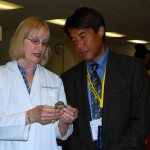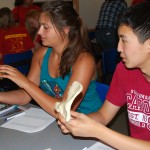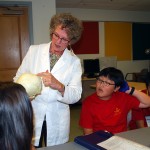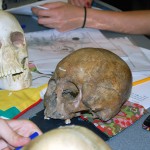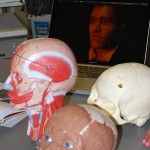The College of Applied Sciences and Arts at San José State University is pleased to announce six professors completed the rigorous process of receiving tenure, promotion or both.

Dr. Danielle Harris received tenure and was promoted to an associate professor in Justice Studies.
Danielle Harris, a Justice Studies professor, received early tenure and early promotion to an associate professor in her fifth year.
Dr. Harris’ research interests include sexual offending and aggression; developmental and life course criminology; the criminal career paradigm; desistance; public policy; female criminality; criminological theory; sexuality and justice. She has published several articles related to sexual offenders about both male and female offenders.
Dr. Harris received her doctorate in Criminology in 2008 from Griffith University, Australia. Prior to that, she completed a Master’s degree in Criminology and Criminal Justice at the University of Maryland (College Park) and a Bachelor of Arts Degree in Justice Studies (with Honors) at the Queensland University of Technology, Brisbane and the University of Westminster, London. Dr Harris is the Director of Research for the Art of Yoga Project, a nonprofit organization that provides a yoga and creative arts curriculum to girls in custody. She is also actively involved in the SJSU Record Clearance Project. When she is not grading or writing, she enjoys travel, theatre, and sleep.
Jessica Chin, a Kinesiology professor, received tenure and promotion to an associate professor.

Dr. Jessica Chin received tenure and promotion to an associate professor in Kinesiology.
Dr. Chin is the research and core specialist for the department of Kinesiology.
She said her favorite part of being a professor is watching her students grow and learn.
“It is rewarding to see my students succeed in and outside the classroom,” she said, “whether by applying a concept in class, demonstrating deep knowledge of a topic on an exam, completing a high-quality research paper, being hired for a dream job, confidently defending a master’s project or thesis, or receiving admission to a highly respected doctoral program.”
She said the most challenging part of the RTP process is trying to excel in all areas of research, teaching and service.
“It’s hard to excel in one area without making sacrifices in another, let alone reserving time and energy to look after my own health,” she said, via email.
Moving forward she is going to continue her research projects and look for new research opportunities. She is part of a research team that recently received a three-year grant to conduct hazing research among college athletes in Canada.
Chin earned her Ph.D. in Kinesiology at the University of Maryland in College Park, MD., where she was a member of the Physical Cultural Studies (PCS) research group. After receiving a national language training grant, she moved to Romania to learn the language and pursue her research examining the physical activity and bodily experiences of women in postcommunist Romania. With the goal of improving the social and cultural climate of sport for girls and women, her current research is centered on examinations of initiation and hazing among female collegiate athletes in the U.S. and Canada. Dr. Chin is passionate about physical activity and remains an advocate for underserved and underrepresented populations through her teaching, research, and community service.
Dr. Chin is an active member of the Western Society for the Physical Education of College Women (WSPECW), the International Sociology of Sport Association (ISSA), and the North American Society for the Sociology of Sport (NASSS), regularly presenting her research at their annual conferences. For NASSS, she serves on the Elections Committee and the Environmental Impact Committee; she has also played an active role on the Diversity and Conference Climate Committee. Further, Dr. Chin served as Chair of the Committee to Enhance Equity and Diversity (CEED) in the College of Applied Sciences and Arts (CASA) from 2010-2014 and was also as an academic consultant to the Bay Area Physical Education-Health Program (Bay PE-HP).
With a strong desire to include students in work that promotes diversity and social justice, Dr. Chin has mentored and advised students in various capacities. As an example, she leads and advises RePlay, a nonprofit, student-based group that seeks to benefit and initiate positive change in local communities and educational institutions. Following the core principles of promoting social justice and a green lifestyle, RePlay collects used sporting goods and equipment, which they refurbish and distribute at events specially organized for underserved community groups. RePlay has organized events and made significant donations to foster children, homeless shelters, underfunded physical education programs, and summer camps. Each event focuses on providing equipment and opportunities for physical activity that otherwise might not be available for these communities.
For leisure, Dr. Chin enjoys training and competing in various sports. Though she is a former powerlifter, she has shifted her focus to triathlons (swimming, biking, running). She is currently a coach and advisor for SJSU’s Triathlon Club and has also advised the Boxing Club and Track & Field Club. She remains engaged in the local sporting community as a U.S. certified umpire for field hockey and girls’ and women’s lacrosse. Since moving to California, she has enjoyed making the most of the beautiful weather offered year round, jumping on every chance she has to ride her bike, run her favorite routes, and explore new hiking trails.
Susan McNiesh, a professor in the Valley Foundation School of Nursing, received tenure and promotion to an associate professor.

Dr. Susan McNiesh received tenure and promotion to an associate professor in the Valley Foundation School of Nursing.
Dr. McNiesh’ s primary research interest is how students learn to be practitioners.
“Practice learning requires learning a certain way of thinking to be open to ambiguity and uncertainty, while being guided by a strong moral compass,” she said, via emial. “For that reason simulation of situations that unfold over time are of interest to me in both my teaching and research.”
She said she enjoys having a dialogue with her students.
“Unfortunately undergraduate students rarely take advantage of office hours just to chat, but graduate students are much more apt to come in and talk about their project ideas,” she said.
She said the most challenging part of the RTP process for her is that she is not a detailed-oriented person so the charts, lists and indexes were a challenge to complete.
She worked as a labor and delivery nurse for 17 years before enrolling at SJSU to complete a master’s in nursing, followed by a PhD in nursing from University of California, San Francisco.
Toby Adelman, a professor in the Valley Foundation School of Nursing, received tenure.

Dr. Toby Adelman, right, pictured at the Grand Canyon with her daughter Shy, received tenure in the Valley Foundation School of Nursing.
Toby Adelman RN, PhD, has been an Associate Professor at the SJSU The Valley Foundation School of Nursing since 2008 and she said she is honored to have received tenure in Spring 2014.
“My career in nursing has been exciting and varied in form,” she said. “I worked primarily in neurosurgery for a decade at UCSF Medical Center, followed by shorter positions in cardiac telemetry, oncology, and outpatient case management, all in San Francisco.”
During her five years at the Institute on Aging in SF, she returned to University California, San Francisco to complete a doctorate in nursing, with a focus on gerontology and health policy. She was selected as a Betty Irene Moore Fellow, requiring her to complete her PhD in three years.
“As a single parent with an eight-year-old daughter at the time, that was a challenge, and very fulfilling when completed,” she said.
In her time at SJSU, she has taught more than 1,000 seniors in addition to supporting a number of masters in nursing students in classes on community/public health and professional role development.
“I have complete confidence that the next generation of registered nurses coming out of SJSU are poised to take on the incredible challenges ahead,” she said. “Our students are bright, inquisitive men and women who are dedicated to life-long learning and providing the best possible nursing care. It is always an engaging experience, being in the classroom and clinical settings with our students.”
She said her favorite part of being at SJSU’s Valley Foundation School of Nursing is seeing graduates obtain employment as RNs and “hearing them share their excitement about being a part of the art and science of nursing, and appreciating the faculty’s part in them being where they are. It feels great to see them succeeding.”
In her off time this summer, she took a two-week, cross-country road trip with her 18-year-old daughter as a graduation present before her daughter heads off to college. They drove Route 66 before heading north to Dr. Adelman’s hometown in Maine, then driving to Boston to turn in the rental car and fly home. In the fall, she will be adjusting as her daughter heads off to college in New York.
She said the most challenging part of the RTP process was to stay on top of everything she does and document it to be evaluated. She said while she was willing to take on lots of projects and is good at executing them, her challenge is documenting all the work.
“I love being a part of the SJSU The Valley Foundation School of Nursing Nurse Managed Centers,” she said. “We are actively engaged in research and practice throughout Santa Clara County and Santa Cruz.”
Her clinical research allows her to engage with many partners on and off-campus, including: The Santa Clara County Public Health Nurse Department; the Stanford Geriatric Education Center; The Health Trust; and The SJSU Center for Healthy Aging in Multicultural Populations.
She recommended those who are starting the RTP process to be organized in documenting all that they do and to learn from department colleagues who have been through the process.
“My nursing faculty colleagues were readily helpful and I appreciate their assistance greatly,” she said.
Her plans for the coming year at the School of Nursing are to continue a research project on incorporating electronic records into the Nurse Managed Centers, presenting the research utilizing the Stanford Geriatric Education Center’s ethno-geriatric teaching modules at an international conference in Jerusalem, Israel in November, and continuing to work with faculty and community partners to provide students with current, effective knowledge in the art and science of nursing.
Lori Rodriguez, a professor in the Valley Foundation School of Nursing, received tenure and promotion to a full professor.

Dr. Lori Rodriguez, back, hoods Dr. Diane Crayton at the CSU, Fresno DNP graduation ceremony, a joint program between SJSU and CSU, Fresno. Dr. Rodriguez received tenure and promotion to a full professor in the Valley Foundation School of Nursing.
Dr. Rodriguez started working at SJSU in the Fall of 2007. As a former intensive care nurse, manager, nurse practitioner and educator, she came to the university with a strong service background. With previous teaching experience and publications, she was fortunate to have a head start on two of the areas required in the RTP process. Whether designing courses or programs, she loves to experiment with new ways of teaching and has found the Learning Management Systems (webCT, D2L, Canvas) to be great support to her teaching. Her greatest joy was to be a part of the graduation of doctors of nursing practice this spring. The RTP process is a nosebleed, she said, and the most challenging part was the detail work involved. Plans for the future include supporting the process of bringing the Family Nurse Practitioner program back to San Jose State to meet the health care needs of the community. In Spring 2015, she will be on sabbatical to conduct surveys and interviews with the graduates of the DNP class of 2014 to determine the degree to which the program prepared the graduates to be faculty, advanced practice clinicians, and/or leaders.
Claudio Vera Sanchez, a professor in Justice Studies, received tenure and promotion to an associate professor.

Dr. Claudio Vera-Sanchez received tenure and was promoted to an associate professor in Justice Studies.
Vera Sanchez’ research interests are centered on how Latino and African American juveniles from underprivileged neighborhoods are criminalized by both nurturing (schools, etc.) and non-nurturing (police, etc.) institutions. His work has also involved channeling at-risk Latino and African American youth, some who have been previously gang affiliated to a path of success. He has taught courses on statistics, qualitative research methods, juvenile delinquency, and the policing of Latino and African American youth.







